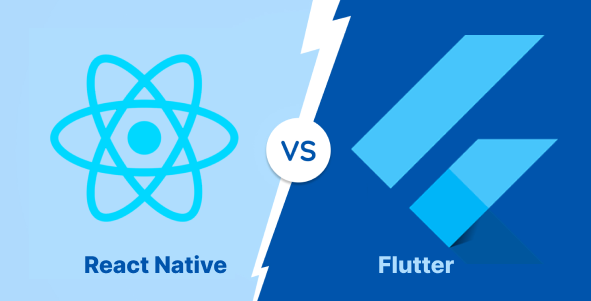
React Native and Flutter emerge as leading choices for cross-platform mobile development. These frameworks empower developers to craft applications compatible with both iOS and Android using a singular codebase. The appeal lies in the efficiency gained by unifying the development process across platforms, resulting in notable time and cost savings. The selection between React Native and Flutter is often guided by project specifications, the team's skill set, and individual inclinations.
a product of Facebook, is a versatile cross-platform mobile development framework. This technology facilitates the creation of applications that possess a native appearance on both iOS and Android devices while leveraging a unified codebase. Positioned on the foundation of React, a widely-used JavaScript library, React Native provides developers with an efficient means to craft mobile applications that seamlessly transcend platform boundaries.
an innovative cross-platform mobile development framework developed by Google, empowers developers to create applications with native aesthetics for both iOS and Android using a unified codebase. Distinguished by its unique approach, Flutter employs a proprietary rendering engine crafted in C++, setting it apart from other frameworks in the mobile development landscape.
Here is a comparison of React Native and Flutter:
When comparing the performance of React Native and Flutter, Flutter generally showcases superior performance. This advantage stems from Flutter's utilization of its own rendering engine, meticulously crafted in C++. This engine is optimized to deliver graphics and animations of native quality, contributing to the overall efficiency of Flutter applications.
In contrast, React Native relies on the native rendering engine of each platform. Consequently, React Native apps are bound by the performance limitations of the underlying native UI elements.
React Native, on the other hand, uses the native rendering engine on each platform. This means that React Native apps are ultimately limited by the performance of the underlying native UI elements.
However, it’s important to note that the performance difference between React Native and Flutter apps is relatively small. For most apps, the difference will not be noticeable to users.
However, if you’re developing a performance-critical app, such as a game or a real-time streaming app, then Flutter is the better choice.
There are a number of factors that can affect the performance of a React Native or Flutter app, including:
If you’re concerned about performance, then it’s important to optimize your code and use the right libraries and tools. You should also test your app on a variety of devices to make sure that it performs well on all of them.
In summary, React Native and Flutter stand out as robust cross-platform mobile development frameworks, capable of delivering high-quality applications for both iOS and Android platforms.
The choice between the two should be guided by your unique needs and preferences. If ease of learning and a large, well-established community are paramount to you, React Native proves to be a favorable choice. On the other hand, if you prioritize top-notch performance and a framework with its own optimized rendering engine, Flutter emerges as the preferred option. Ultimately, the decision hinges on striking a balance between ease of use, community support, and performance based on the specific goals and characteristics of your project.
This website uses cookies to enhance your browsing experience, analyze site traffic, and serve better user experiences. By continuing to use this site, you consent to our use of cookies. Learn more in our cookie policy